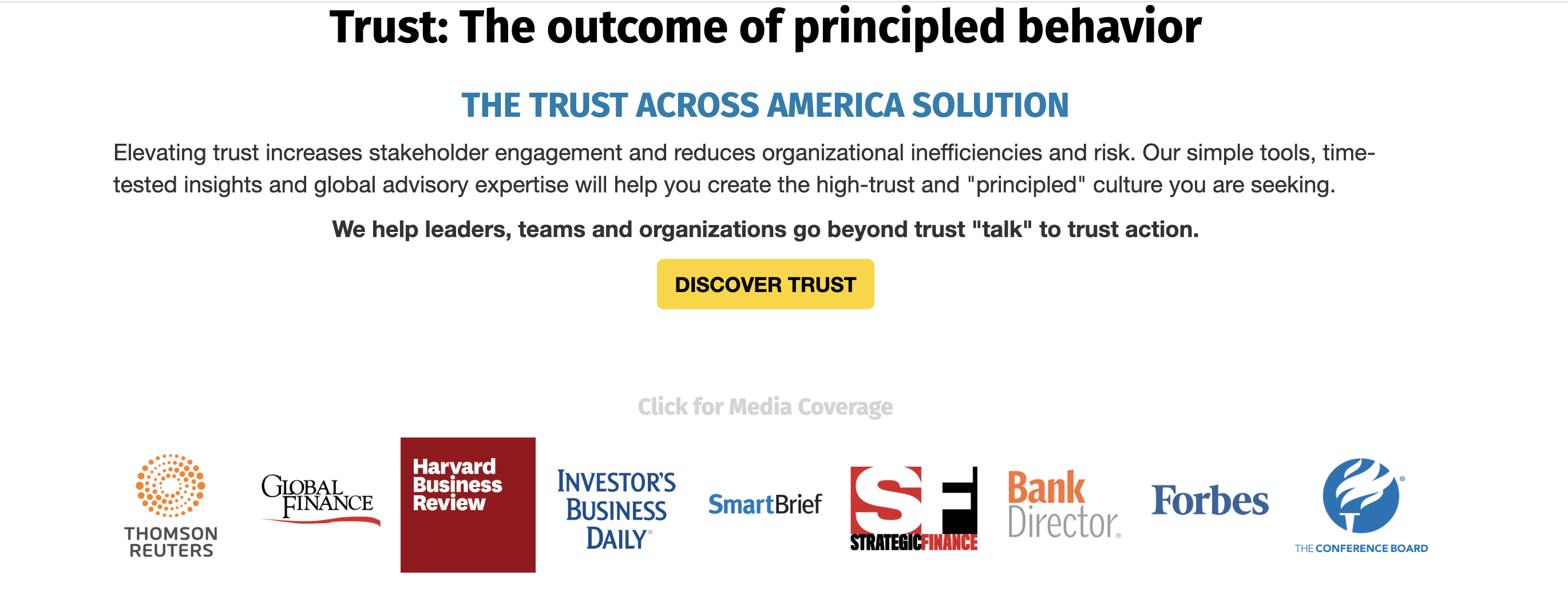 Regardless of your occupation, job title, or the type of organization that employs you, have you ever considered the role trust plays in leadership, team and organizational success?
Regardless of your occupation, job title, or the type of organization that employs you, have you ever considered the role trust plays in leadership, team and organizational success?
And are you helping to build (or deplete) your organization’s trust bank account?
If you haven’t given any or much thought to these questions, you certainly are not alone. In fact, most people view trust as a soft skill that can simply be taken for granted. But consider this for a moment; there has never been a more critical time to acknowledge and embrace the business case for trust.* In fact, study after study confirms that over the long-term, high trust organizations outperform their low trust competitors, with the following benefits:
- Elevated employee engagement and retention
- Reduced workplace stress
- Enhanced decision-making
- Innovative culture
- More accountability, transparency and communication
- Reduced costs
Using our definition of Trust as “an OUTCOME of principled behavior,” what we knew about the benefits of high trust in the past is currently amplified in our current business environment. Often, it takes a crisis to remind us what happens when trust is ignored or taken for granted.
Whether you are working in person or remotely, these are some characteristics of a high trust workplace environment. How many are currently present in yours?
- Energy, motivation and engagement
- Easy to hire and onboard new employees
- Fun and laughter
- High confidence, creativity and risk taking
- Thriving innovation and productivity
- Team alignment, sharing of information and credit, and quick forgiveness
- Accountability and transparency as the norm
- Willingness to be vulnerable and open, speak freely, and to listen
- Positive team-building behaviors including gratitude, empathy and candor
- A strong sense of “community” and shared values
How many of the following signs of low trust are present in your workplace?
- Lack of transparency
- Distortions of truth
- Disrespect
- Hidden agendas
- Poor communication
- Low accountability
- Short-term thinking
- Inconsistent talk and actions
Leaders who ACKNOWLEDGE that low trust is a tangible risk have taken the first step in building a trust based team and/or workplace. And acknowledgement remains the greatest obstacle in most organizations as it requires direct leadership attention and input, and some degree of vulnerability. If this hurdle can be overcome, then it simply becomes a matter of IDENTIFYING the personal and interpersonal strengths and weakness that are either building trust or busting it. They can then be discussed, MENDED and tracked. Our Trust Across America program calls this AIM Towards Trust, and the tool is being easily adopted by enlightened leaders of teams and in organizations of all sizes and across industries, providing a path forward to high trust.
If a long term approach to elevating trust is not a leadership imperative at this time, all is not lost. Here are a few short-term ideas that any team can implement during the current crisis.
- Consider hiring or appointing a remote-workforce manager.
- If you didn’t already have one, a crisis-continuity plan should be created.
- Be clear about all expected outcomes with the focus on results rather than hours worked.
- Ensure that all team members have a line of sight between the goal of the company and his or her personal contribution in getting to the goal post.
- Have frequent touch points with your team about work-related matters and also about personal needs. It’s critical not to overlook your employee’s mental health during these difficult times.
- Establish a buddy system for new employees.
- Get your workforce up to speed with technology, but don’t over invest in it or view it as a quick and easy trust “fix.” Set aside some of that budget to learn how to build trust. It may be a little more work but will produce much great rewards over the long-term.
- Access our Trust Alliance Principles for additional ideas and remember the weakest behaviors break the trust chain. (Over 140,000 global professionals already have.)
Which organizations will emerge the strongest from COVID-19? Probably those whose leaders chose to place trust in the center of their business strategy before March 2020. In fact, leaders and their organizations who banked trust in advance of the pandemic are now being handsomely rewarded and will continue to be long into the future. It’s never too late to start thinking about the role of trust in leadership, team and organizational success. Why not today?
*To receive a copy of our two-page Business Case for Trust, please contact us.
Barbara Brooks Kimmel is the founder of Trust Across America-Trust Around the World, whose mission is to help organizations build trust. Now in its 11th year, the program has developed two proprietary trust-evaluation tools. She also runs the world largest global Trust Alliance and is the editor of the award-winning TRUST INC. book series. Kimmel is a former consultant to McKinsey who has worked across industries and with many Fortune 500 CEOs. She holds a bachelor’s in international affairs from Lafayette College and an MBA from Baruch.
Copyright 2020 Next Decade, Inc.


Recent Comments